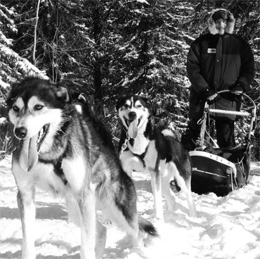 |
 |
 |
 Travel & Outdoors | September 2007 Travel & Outdoors | September 2007  
Explosion of Ecotours Offer Real and Ersatz Vacations
 Bruce Constantineau - CanWest News Bruce Constantineau - CanWest News
go to original


| | The ecotourism industry offers year-round adventures in Canada's rugged landscape, from handling a dog team to white-water rafting. (Sundogs Excursions) |
Vancouver - The green revolution has created an unprecedented demand for vacations that teach people about the environment while having as little impact on the environment as possible.

Literally thousands of Canadian ecotourism companies now operate in one of the fastest-growing sectors of the global tourism industry.

But many so-called "eco-tours" are, in fact, just ordinary operations that "greenwash" themselves by embracing the ecotourism label while doing little to act in an environmentally responsible manner.

"It's a huge problem and the ecotourism industry globally is struggling with it," says Ayako Ezaki, a representative of The International Ecotourism Society (TIES).

"It's easy for anybody to claim they're an ecotourism company because they have a lodge in the forest. The challenge for consumers is to make sure you understand exactly what they mean by ecotourism."

A 1990 TIES definition of ecotourism remains the industry standard - "Responsible travel to natural areas that conserves the environment and improves the welfare of local people."

Ms. Ezaki said concerned travellers should contact ecotourism operators and ask lots of questions before booking a trip.

What sustainable practices do they engage in? Do they offer interpretive guiding and other educational opportunities? Do they purchase carbon offsets? Do they hire local employees?

The TIES Web site offers a "Travel Choice" section, where several recommended ecotourism options appear after you click on your intended destination.

Operators listed on the site have signed a code of conduct, promising to minimize their impact on the environment and provide direct benefits to conservation.

Esprit Rafting Adventures, based in Quebec on the Ottawa River, makes the TIES list.

Co-owner Jim Coffey says true ecotourism offers a combination of adventure, culture and environmental interpretation, with the help and support of the local community.

"Rafting is not necessarily a life-changing experience for anyone, but it's a way to get people outdoors learning about what's out there," he says. "Our role is to be a steward or an intermediary between the wilderness and our guests."

Esprit operates from a winter base in Mexico and also conducts rafting, canoeing and kayaking trips with partners in Costa Rica, Chile, Argentina, Ecuador and India.

Mr. Coffey says he operates in a small Mexican village - beside several local, family-run outfitters - along a river that used to be threatened with damming.

"But the whole community is involved in tourism and it has become impossible to dam that river," he says. "Tourism saved it and I'm very proud to have been a part of that."

Esprit has one of the Ottawa River area's biggest composts and it buys about $2,000 worth of carbon offsets a year from a Calgary-based group that invests in wind-power.

Nimmo Bay Resort owner Craig Murray, who has operated the popular luxury lodge along the British Columbia coast since 1980, isn't convinced that buying carbon offsets is the way to go.

"We'll look at it but the jury is still out on that stuff," he says. "I personally think carbon offsets can be just an excuse for polluters to feel good about themselves by paying their way out of polluting."

"I'd rather do what I can to lessen our carbon footprint on our own."

Mr. Murray embarked on a green crusade long before it became the fashionable thing to do. One of the first things he did was spend $50,000 on a turbine that generates hydro power from a local waterfall and still supplies 80% of the resort's electrical power. Most of the resort's drinking water also comes from the same falls.

Other measures include recycling cooking oil to make biodiesel, installing a waste-water system that produces clean effluent, using compact fluorescent light bulbs, recycling food and beverage containers, using homemade prepared food to reduce the need for pre-packaged food and getting forest company Interfor to protect viewscapes by not logging certain areas.

While some resorts now strive to cut their carbon footprints by 50% over the next few years, Mr. Murray says that's an unrealistic goal for Nimmo Bay and stresses there is no such thing as a "zero footprint."

"We started this a long time ago, so some of those guys who say they'll cut their footprint by 50% still won't be where we are today," he says. "We might be able to cut it by another 10 or 15% but to cut it by 50% would be ridiculous. We'd be out of business."

Visitors pay about $6,000 for a three-day stay at Nimmo Bay, and Mr. Murray says that without exception, they all understand and appreciate the resort's efforts to reduce its impact on the environment.

"When people come out so see what's left of the environment, they really appreciate what has to be done to preserve what's still there," he says.

Sundogs Sled Excursions owner Bradley Muir, who operates dog-sledding tours through the Saskatchewan boreal forest from November through March, agrees.

His own green practices include tethering his Alaskan huskies so they don't harass or pursue wildlife, cleaning up and composting all refuse and droppings, using minimal food packaging, limiting group sizes to a maximum of 12 people and using solar power for his own accommodation and a guest day lodge.

"Ecotourism doesn't have to happen in unspoiled pristine wilderness," he says. "It happens when you help maintain or restore an environment that's ecologically intact." | 
 | |
 |



